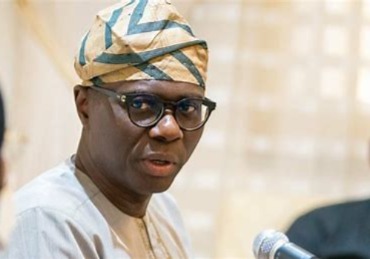As part of efforts to improve the transport system in Lagos State, Governor Babajide Sanwo-Olu unveiled the much-anticipated Omi Eko project on Friday. By 2030, the project is expected to have over 70 electric-powered vessels and 20 upgraded jetties and terminals.
LEADERSHIP reports that the Omi Eko project – meaning Water of Lagos – marks a new chapter in Lagos’ transportation history, focusing on building a sustainable, smart, and efficient water mobility ecosystem. Designed to ease pressure on the city’s congested roads, the initiative seeks to harness the state’s vast waterways to connect communities more efficiently while promoting clean energy and innovation.
Governor Sanwo-Olu described the initiative as part of his administration’s integrated transport strategy, linking water, rail, and road systems for seamless mobility
“We are building a water-based economy that works for all – from operators to passengers, from private investors to citizens,” he said.
The Governor also noted that Lagos has set up Africa’s first water waste monitoring and data centre to provide real-time visibility and ensure commuter safety.
He recalled that the state recently hosted Africa’s first electric powerboat race, signalling its commitment to innovation and environmental stewardship.
On his part, the special adviser to the Governor on Blue Economy, Damilola Emmanuel, highlighted that the $410 million Omi Eko project is the most significant inland waterways investment in Africa.
Damilola, who is also general manager of Lagos State Waterways Authority (LASWA), traced the evolution of water transportation in Lagos from the establishment of LASWA under former Governor Babatunde Fashola to its expansion under Sanwo-Olu, who has “brought life to the master plan and turned vision into reality.”
According to Emmanuel, the project will deploy 70 hybrid-electric ferries to reduce emissions and promote cleaner mobility, noting that the boats will be handed over to private operators.
The project will also see the upgrade of 20 jetties and terminals, dredging and channelization of 15 routes for safer and faster navigation, and capacity development for water transport operators.
Emmanuel acknowledged international partners such as; the European Investment Bank (EIB) and the European Union (EU) for supporting the project, even as he commended the Lagos State House of Assembly, Civil Service, and LASWA staff for their roles in realizing the vision.
“This is no longer a dream – we are living the dream. As Lagos learns to move with its waters, it will discover the rhythms of its prosperity. The journey has just begun, and the future of Lagos lies in harnessing the blue economy for shared progress.”
On his part the European Union Ambassador to Nigeria and ECOWAS, Gautier Mignot, noted that project enjoyed EU sponsorship because it is on the Abidjan-Lagos transport corridor which is part of the Global Gateways Strategy.
His words: “Africa is home to some of the fastest-growing cities, presenting challenges and opportunities for transport systems, Lagos being a prime example. Scaling existing small-scale public transport networks to create more efficient and sustainable large-scale systems will improve accessibility and mobility with very concrete impacts on the daily lives of millions of urban dwellers in Lagos State.
“Sustainability is essential to the global gateway’s transport objectives for Africa, with investments tailored to reduce the negative impacts of transport on health, the environment and climate change.
“This is the promise offered by Omi Eko by promoting greener, more inclusive and resilient urban mobility in Lagos. Each year, CO2 emissions will drop by 41,000 tons, and 25 million passengers will save an average of three hours of travel time on the commuter trip at peak hour. We can anticipate that in the long term, the project will become the perfect means of transportation by Lagos.”
Meanwhile, the French Minister for Europe and Foreign Affairs, Jean-Noel Barrot, described the project as one of the benefits of the partnership between Nigeria and France.
“This Omi Eko and the unique electric ferries will thrive amid rising sea levels and suppress carbon emissions,” Barrot posited.
Also speaking, the chairman of Lagos State House of Assembly Committee on Transport, Hon. Temitope Adewale, affirmed that Omi Eko aligns with the Committee’s commitment to a safe, effective and efficient multimodal transport system in Lagos.
“To residents and commuters, this project is yours to own. Be assured of our Committee’s support in ensuring Omi Eko’s success via legislative processes,” Adewale said.





